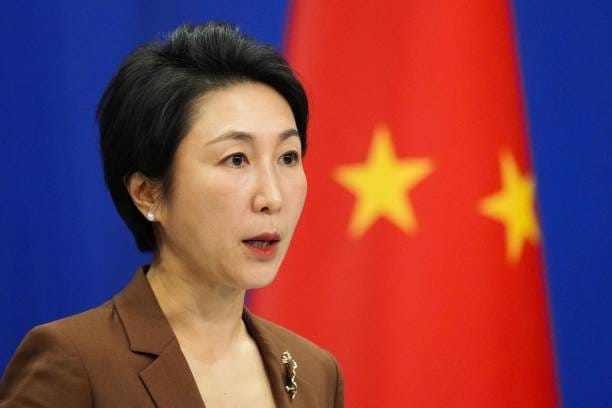

China calls for immediate withdrawal of U.S. missile system from the Philippines, citing heightened regional security risks.(Photo by Kyodo News via Getty Images)
(EPICSTORIAN) – China has urged the Philippines to immediately withdraw the U.S. Typhon mid-range missile system stationed within its territory, emphasizing that its presence undermines regional peace and stability.
Speaking at a regular press briefing, Chinese Foreign Ministry spokesperson Mao Ning reaffirmed Beijing’s opposition, describing the deployment as “a provocative and dangerous move” that fosters geopolitical confrontation and an arms race.
Missile system Threat to Regional Peace
Mao emphasized the region’s need for “peace and prosperity, not mid-range missiles and confrontation,” urging Manila to “correct its wrongdoings” and withdraw the missile system promptly.
The U.S. Army deployed the Typhon system in the northern Philippines earlier this year during joint military exercises with its longstanding ally.
Despite Beijing’s criticism, the system remained in place post-exercises. The Philippines has since announced plans to acquire the Typhon system to bolster its maritime security amid rising tensions in the South China Sea.
Philippine National Security Adviser Eduardo Ano stated that the Typhon system would remain in the country for military training purposes, with no immediate plans for its withdrawal. He emphasized the system’s role in enhancing the Philippines’ defense capabilities.
China’s concerns stem from the Typhon system’s capacity to launch missiles capable of reaching Chinese territory, which Beijing perceives as a threat to regional stability. The Chinese government has consistently opposed the U.S. military presence in the region, viewing it as an attempt to contain China’s influence.
The Philippines, however, maintains that strengthening its defense capabilities is a sovereign right, especially in light of recent confrontations with Chinese forces in disputed areas of the South China Sea. Incidents have included the use of water cannons and bladed weapons by Chinese coast guard personnel against Philippine vessels.
The situation underscores the complex dynamics of U.S.-China-Philippines relations, with Manila striving to balance its longstanding alliance with Washington and its economic ties with Beijing. The deployment of the Typhon missile system adds another layer of complexity to the already tense security environment in Southeast Asia.
In recent years, China and the Philippines have experienced fluctuating relations, marked by both cooperation and contention. Territorial disputes in the South China Sea have been a significant source of friction, with both nations asserting claims over strategic maritime areas. The Philippines has accused China of aggressive actions, including the use of water cannons and military-grade lasers against its vessels.
Regardless of these challenges, both countries have engaged in diplomatic dialogues to manage tensions. However, the recent deployment of the U.S. Typhon missile system in the Philippines has further complicated the situation, with China perceiving it as a provocative act that could escalate regional tensions.
The Philippines, on the other hand, views the enhancement of its defense capabilities as essential for safeguarding its territorial integrity amid ongoing disputes.







